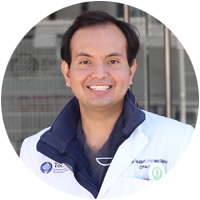Luis Rodríguez, MD | Foundations of Clinical Research

Luis Rodríguez, MD, is an ophthalmologist originally from Venezuela. He completed medical school as well as an ophthalmology residency at Mexico’s Monterrey Institute of Technology followed by a cornea fellowship at the National Autonomous University of Mexico. Rodríguez later traveled to Chennai, India, to complete his ocular surface fellowship at Sankara Nethralaya Medical Research Foundation. In May 2024, he graduated from Harvard Medical School’s Foundations of Clinical Research certificate program.
After completing extensive medical training and multiple ophthalmology fellowships, Rodríguez joined the University of Miami’s Bascom Palmer Eye Institute as a clinical research fellow in the field of ocular surface immunology in November 2023. He researches the efficacy of new diagnostic devices for patients suffering from dry eye and also reviews medical and surgical outcomes in patients with immune diseases that affect the ocular surface, such as mucous membrane pemphigoid and Stevens-Johnson syndrome.
A Doctor with a Passion for Clinical Research
As Rodríguez began his new clinical research role at Bascom Palmer Eye Institute, he felt the need to formalize his clinical research education and training. Medical students receive well-rounded training and are exposed to clinical research outcomes and treatment options for patients. However, for those looking to expand their career opportunities and take a more active role in the clinical research process, additional training and technical analysis skills are required.
To that end, Rodríguez sought out an educational experience that would boost the impact of his own clinical research. “I was looking for a program that would teach me how to formulate a research question, choose the right type of study, analyze and interpret clinical results using statistical software, and scientifically communicate the results to peers,” he explains.
He selected Harvard Medical School’s Foundations of Clinical Research program for two reasons: the curriculum lays the groundwork in epidemiology and biostatistics to train the next generation of clinical researchers, and HMS faculty conduct live virtual seminars on how to use the statistical analysis software STATA.
“As a doctor with an interest in clinical research, I felt it was pivotal for my career to learn how to design the study in which I’m formulating a research question and how to collect that information. This program was the perfect fit,” he adds.
Real-Time, Skill-Based Learning
During the six-month Foundations of Clinical Research online certificate program, students take a hands-on approach to their training with faculty support. Using real data sets for analysis, they formulate a research question and design methodology and develop an e-poster that is presented and critiqued by peers and faculty. “I want to thank the program faculty for teaching my classmates and I how to synthesize important information in the biostatistics and epidemiological fields. Learning how to use the statistical analysis software (STATA) was the most valuable part of the program,” he says.
The virtual environment of the certificate allows students to continue their education while upholding the responsibilities of their demanding careers and other commitments. On a weekly basis, Rodríguez interacted with classmates from across the globe, expanding his professional network and perspective. In 2025, he intends to apply to the Global Clinical Scholars Research Training certificate program at Harvard Medical School.
Written by: Meredith Faxon